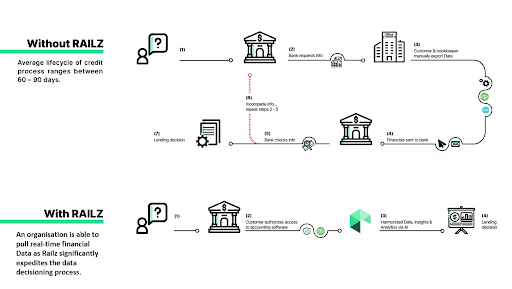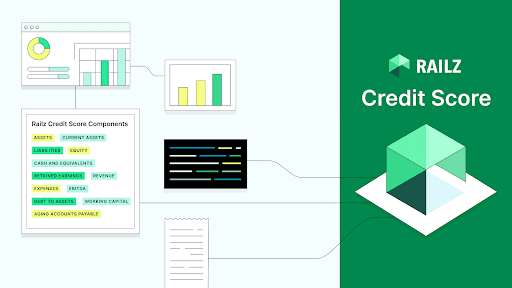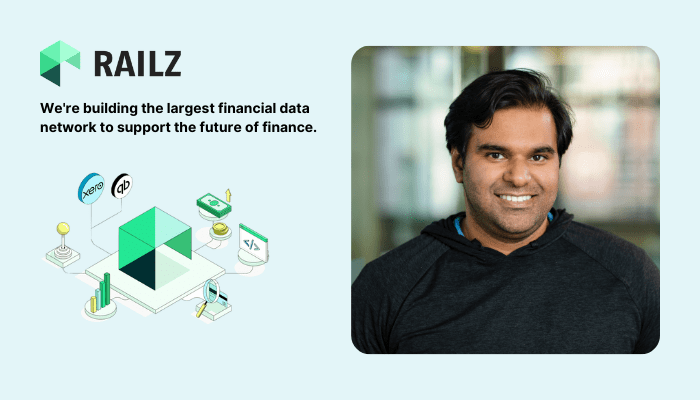Railz is a fintech company with the aim of building the largest financial data network. The company recently raised $15M in funding. Railz was accepted into the FIS 2021 Accelerator Program, while Visa announced the expansion of their Fintech Partner Connect program which includes Railz. CEO Sohaib Zahid will be telling us more about Railz and the opportunities the company is creating.
Please tell us more about yourself?
Hey, everyone! I’m Sohaib Zahid, the co-founder and CEO of Railz. I am a serial entrepreneur and have spent over a decade successfully building teams, products, and companies. Prior to founding Railz, I was a founder of Vanhawks. In my free time you can find me with my family or cycling.
What is Rail, could you give us a walkthrough of the ecosystem and the technology behind the platform?
Railz provides fast and direct access to commercial customers’ financial data through a single API.
Interestingly, my co-founder and I came up with the idea for Railz separately. I realized that getting normalized accounting data is a massive pain point for companies building various business applications within the Intuit ecosystem. There was no one building the developer’s first API tools for companies to access normalized accounting data to build new SME fintech applications. For Derek Manuge (our CTO), the idea was born out of the struggles he faced while working as a quant. Obtaining data to build better models or make better decisions was 50-80% of his time and he knew there had to be a better way.
Railz is building the largest financial data network by bridging the connection between future-thinking financial institutions and real-time accounting data. Railz accomplishes this through an API that connects financial institutions to all major accounting software solutions, such as QuickBooks, Xero, and Sage. We offer financial institutions (FIs) the ability to connect with account service providers, collect data, normalize and sanitize that accounting data, and analyze it. We recently started to service the long-tail of the SMEs which don’t use accounting software to run their business i.e solopreneurs, gig-workers, content creators etc.
Railz enables on-demand access to financial transactions, analytics, insights and reports on small and medium business (SMB) customers. Our solution works for everyone in the digital banking space – from startups to community branches to Fortune 500 companies. Whether you’re a lender, financial institution, accounting firm, auditor, or startup developer that requires financial data, we can make this a reality for you – and fast.
Most accounting time is spent on data collection and analysis when making decisions around a loan or capital. Railz is inspired to solve this problem by building a solution that automates the data collection and analysis process so that accounting data could be used for real-time decision-making.
In this digital era, the importance of financial data and accounting innovation cannot be overemphasized, could you share some of the global market statistics with us on financial data?
As your financial institution is well aware, there are over 30,000,0000 businesses in the United States – SMBs are the backbone of the economy. The only way you can successfully use the financial data from 30,000,000 businesses is to have that data arrive to you clean, standardized, and correctly mapped – what we refer to as normalization. We handle financial data normalization so you don’t have to.
The world is built on data, and is moving so fast that you need access to data in real-time. The financial industry is no different. As per Forbes, the amount of data created and consumed in the world increased by almost 5000% from 2010 to 2020. Whether you’re a financial technology startup or a long-held financial services provider, you rely on your small- and medium-sized businesses’ (SMBs’) financial data in order to offer the best services and value to your commercial customers.
Tell us more about the Railz Accounting Data-as-a-Service™ product solution for the future of finance, what does Accounting Data-as-a-Service mean and how does this work?
Our Accounting Data as a Service API provides a single connection to all major accounting service providers, normalizing the data and adding analytics and other metrics to enable enhanced decision making.
I want to take this opportunity and address to a list of challenges Financial Institutions facing while accessing financial data:
- Low speed: It takes weeks/months to manually receive and manage financial data from SMB customers.
- High level of risk: Collecting data manually increases the risk of omissions, errors and loss – accidentally and/or intentionally!
- Expensive: Outsourced ERP solutions and internal builds are extremely costly and integration takes time.
The solution to the mentioned challenges is using Railz Accounting Data-as-a-service that provides quick, cost-effective and direct access to most of the key SMB Accounting systems (eg. Xero, Quickbooks, MYOB, Sage, etc) via a single API.
What makes our API outstanding in the market is that Railz:
- Normalizes all of the disparate accounting data
- Map all chart of accounts and create a universal data format,
- Provides clean, structured raw data without manual intervention,
- Allows users to conduct risk assessment, as well as financial health, analysis accurately and as often as needed,
- Provides an “out of the box” value-added dashboard to assess risk and fraud metrics, as well as data analytics and insights, and
- Implemented in a matter of days, rather than weeks or months.

The accounting-data-as-a-service in action
What is normalized financial data and why is having it necessary for financial institutions?
Accounting and financial data is exceptionally messy by default and navigating numerous layers of accounting data in the absence of an army of specialists can be enormously challenging to SMBs and more importantly to the financial institutions providing services and products to SMBs.
Railz uses the Chart of Accounts as a standardization reference to efficiently normalize across all financial statements with a 99.9% level of accuracy – this is important because it ensures integrity of the accounting data. We cluster all possible combinations of raw ASP categories by the largest subset of unique class types, Railz subGroup, then map these subGroup values to our standard super sections (Section, subSection and Group). Once we have completed this outer relationship between the ASP and Railz internal subGroup, the mapping to the super sections (Group, subSection, Section) can be easily calculated. Thus, through a carefully tuned text matching method, you get the benefits of our normalization engine.

Railz Normalization engine at work: text matching method.
The result of gathering all accounting and financial data on SMBs through one API and normalizing the data is an easy-to-use, cohesive Accounting Data-as-a-Service™ framework that empowers financial institutions to make the most of their SMB data. Normalizing data for your financial institution also considerably reduces development efforts when building and managing accounting integrations for your financial product and services.
How does Railz approach credit risk scoring with Railz Credit Score?
Data is plentiful, but leveraging this trove of information for credit risk purposes can be messy and difficult, as each data provider maintains their own individual data structures. Railz’s unique capabilities as an accounting and financial data normalization engine, present an exciting opportunity to provide analytics and insights into credit risk from accounting data. Railz uses structural credit models and machine learning to develop a holistic credit risk scoring system that is simple to use and understand. When a business registers with us through your financial service company, we provide a 36-month time series of probabilities of default, a proprietary score between 300 and 850, similar to a retail (FICO) credit score, and a mapping to an analogous Moody’s, S&P, DBRS, and Fitch score, and a digestible description of our assigned rating.

Railz Credit Score relies on real-time financial components.
Railz’s analytics and insights suite takes a deep dive into the financials and behavioural patterns of borrowers, and our credit score can be considered an amalgamation of the available financial and accounting information a business can digitally provide. We are providing an alternative to an assessment of risk based on a single information source, such as past behaviour or balance sheet, as this may classify many new companies as unworthy of lending to, such as startups who do not own significant high-value assets. These companies, however, may have sufficient cash inflows to cover their obligations, or own intellectual property, which is difficult to value on the balance sheet but valuable to your institution as the lender or creditor. Each piece of information, while informative, can not provide the full picture of the health of a business alone. Factors that the Railz credit scoring algorithm incorporates include: balance sheet items such as assets and liabilities, income and cash flow statement items such as earnings and cash flow, financial ratios such as measurements of leverage and liquidity, and behavioural data. Railz handles this process every step of the way from the data normalization to the final credit score.
Tell us more about the Importance of SOC 2 Compliance, could you share some of your success stories, use cases and who you work with at Railz?
We are proud to announce our SOC II compliance. Railz is committed to providing secure products and services to safely and easily manage digital identities of our customers at financial institutions and fintech companies as well as their commercial customers. These new external certifications provide independent assurance of our dedication to protecting our customers and their data. Undergoing regular assessing and validating the protections and effective security practices of Railz instills long-term trust with our customers and their end users.
Our Cloud provides maximum security with complete customer isolation in a modern, multi-tenant cloud architecture. Our Cloud leverages the native physical and network security features of the cloud service. It also relies on the providers to maintain the infrastructure, services, and physical access policies and procedures.
What should we expect next from Railz, do you have more information to share with our readers today?
Here at Railz, we know working at a startup isn’t always easy – whether you’re creating your sample product, working out the bugs in your software, or financing your next big idea, building a startup can keep you on your toes. To make things easier, we’ve introduced the Railz Startup Program, which allows startup companies to use Railz’ financial data API for free.
Including unlimited free connections, accounting integrations, and the ability to access all of our environments (including both sandbox and production) for 6 months, the Railz Startup Program gives companies that have been operating for less than 2 years or have under $3M in revenue access to the accounting data-as-a-service API for free – no questions asked.
With no monthly minimums, no long-term contracts, automatic and on-demand data syncing and plenty of support (users and developers can access our email and chat features and talk to other users and developers within the Slack community), you’ll be in good company: plenty of other startups are already using Railz to shape the future of tech. Incubators and accelerators like plugandplay, Fintech Cadence, Foundersbeta, Ondeck, and Fintech Montreal all offer Railz free to their portfolio companies.
From lending and banking to insurance and portfolio management, Railz’ accounting data-as-a-service API is powerful enough to take on multiple platforms and agile enough to be easily integrated into your existing operations.

































